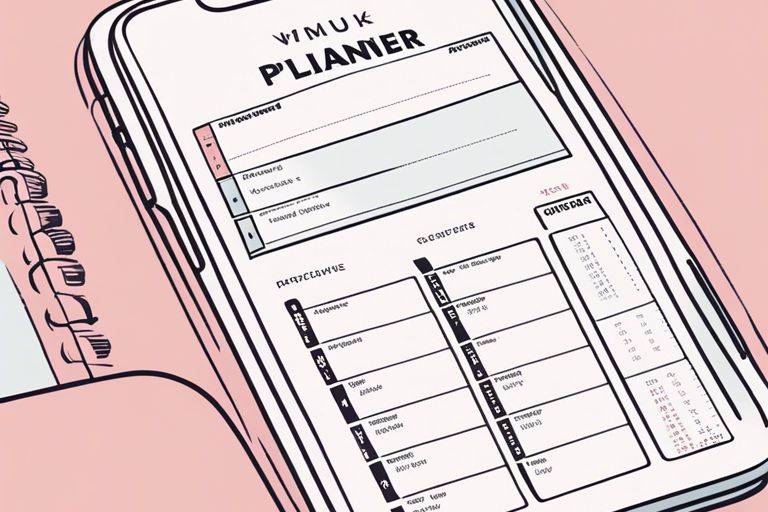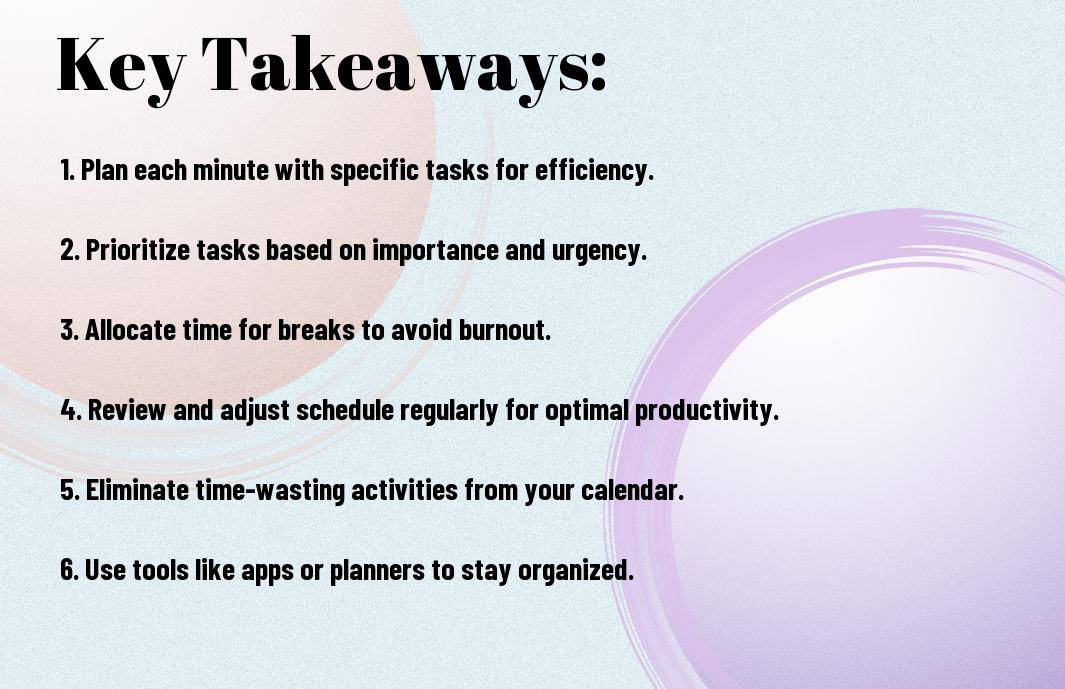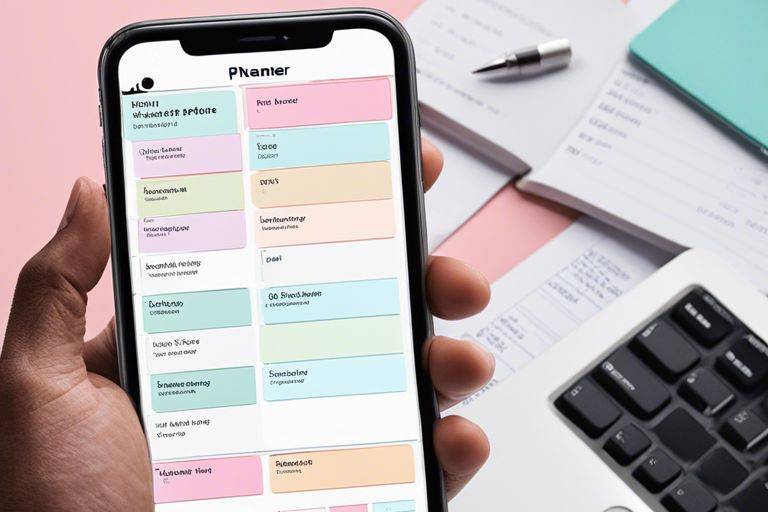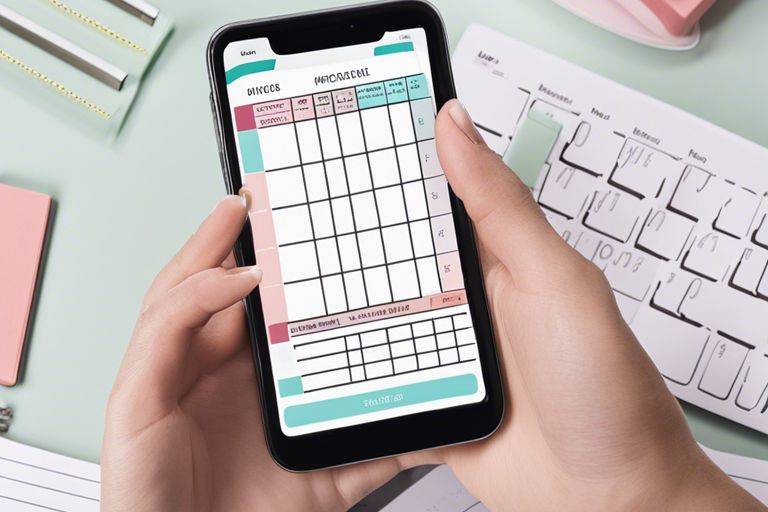
Newsletter Subscribe
Enter your email address below and subscribe to our newsletter

Enter your email address below and subscribe to our newsletter

Zero-Based Calendar! Just imagine a day where every minute is accounted for, maximizing your productivity and efficiency. This concept is known as a Zero-Based Calendar, where every moment of your day is meticulously planned and utilized to its full potential. By adopting this approach, you can eliminate wasted time and ensure that you are making the most out of each day.


Clearly, understanding the concept of a Zero-Based Calendar is crucial before implementing it into your daily routine. This unique scheduling method focuses on maximizing productivity by allocating every minute of your day to a specific task or activity.
An Zero-Based Calendar involves meticulously planning out your day in advance, ensuring that there is no unaccounted time wasted. This approach originated from the concept of zero-based budgeting, where every dollar is allocated to a specific expense, leaving no room for wastage.
Traditional Time Management Systems
| Traditional | Zero-Based Calendar |
| Flexible scheduling | Every minute allocated |
| Room for spontaneity | No unaccounted time |
| Less structured | Highly structured |
A Zero-Based Calendar is a more structured approach to time management compared to traditional systems. By allocating every minute of your day, you eliminate room for procrastination and ensure maximum productivity. While traditional systems offer more flexibility and room for spontaneity, they may not be as efficient in utilizing every moment of your day.
Any successful endeavor requires the right tools and resources. As far as implementing a zero-based calendar, you have a variety of options to choose from. Popular digital tools like Google Calendar, Microsoft Outlook, or Trello can help you organize your day efficiently. Alternatively, you can opt for a traditional paper planner or a bullet journal to map out your schedule.
Be mindful of, the key is to find a system that works best for you and that you will consistently use. Experiment with different tools and resources until you find the perfect fit for your zero-based calendar planning.
To kickstart your zero-based calendar, you need to allocate time for every minute of your day. This may seem daunting at first, but breaking down your day into smaller increments can help you stay on track and make the most of your time. Begin by outlining your fixed commitments such as work hours, appointments, and meals.
Your foundation will serve as the backbone of your zero-based calendar, ensuring that every minute is accounted for. By diligently planning each moment of your day, you can optimize your productivity and make progress towards your goals every day.
Many individuals struggle with time management and finding ways to be more productive throughout their day. One effective method that has gained popularity in recent years is strategic time blocking. This scheduling technique involves dividing your day into blocks of time dedicated to specific tasks or activities, ensuring maximum efficiency and productivity.
One key principle of time blocking is setting aside uninterrupted periods for focused work. By eliminating distractions and dedicating a block of time to a particular task, individuals can enhance their concentration and productivity. Additionally, time blocking helps individuals allocate time for both work and personal activities, promoting a healthy work-life balance.
Principles of creating blocks for high-priority tasks involve identifying the most important and urgent responsibilities that need to be accomplished. By prioritizing these tasks and allocating dedicated blocks of time for completion, individuals can ensure that crucial work is not overlooked or delayed. This approach allows individuals to tackle challenging tasks when they are most alert and focused, leading to efficient and effective outcomes.
For instance, individuals can schedule a block of time in the morning for deep work that requires intense focus and concentration. By setting aside this time without any interruptions, individuals can accomplish significant strides in complex projects or tasks that require critical thinking and analysis.

Not adhering strictly to a packed schedule is crucial for maintaining productivity over the long term. While it may seem counterintuitive, taking breaks actually helps improve focus and overall performance. Studies have shown that brief breaks throughout the day can prevent burnout, increase creativity, and enhance problem-solving skills. By incorporating short periods of rest into your schedule, you can recharge your mind and body, allowing you to return to tasks with renewed energy and clarity.
Building in buffer times between tasks is a smart strategy to accommodate unexpected delays or additional time needed for complex tasks. By allotting extra time in your schedule, you can prevent feeling rushed or stressed when things don’t go as planned. Additionally, having buffer times allows for more flexibility in your schedule, giving you the freedom to adjust seamlessly when priorities shift or new opportunities arise.
Plus, building in buffer times can help prevent the domino effect of one delayed task throwing off your entire day. It’s a proactive approach to time management that safeguards against overcommitting and ensures that you have the bandwidth to address unforeseen circumstances without derailing your productivity.

All too often, we find ourselves succumbing to distractions and procrastination, derailing our productivity. It is crucial to identify these time wasters to effectively eliminate them from our daily lives. Whether it’s spending excessive time on social media, engaging in unproductive conversations, or simply not prioritizing tasks efficiently, recognizing these habits is the first step towards reclaiming control over our schedules.
One of the biggest challenges in staying productive is combating procrastination and distractions. To counteract these hindrances, it is imperative to implement effective strategies that keep us focused on our tasks. Setting clear goals and deadlines, breaking down tasks into smaller, more manageable chunks, and creating a conducive work environment are all key approaches to minimizing distractions and fostering a productive mindset.
For instance, employing time-blocking techniques can help allocate specific time slots for different tasks, ensuring that every minute of the day is utilized efficiently. By assigning dedicated time intervals for work, breaks, and personal activities, individuals can establish a structured routine that minimizes opportunities for distractions and enhances productivity levels.
Once again, it’s important to emphasize the significance of regularly reviewing and adjusting your schedule to ensure maximum productivity and efficiency. Weekly and monthly reviews are important components of the zero-based calendar system to help you stay on track and make necessary adjustments.
Reviews should involve analyzing how well you’ve adhered to your schedule, identifying any patterns of success or areas for improvement, and making necessary adjustments for the upcoming week or month. These reviews can help you stay focused on your goals and ensure that you are making the most of your time.
Unexpected events are inevitable, and it’s crucial to have a plan in place to adapt to changes as they arise. Whether it’s a last-minute meeting, a sudden deadline, or a personal emergency, being flexible and prepared to adjust your schedule is key to maintaining productivity.
Reviewing your schedule regularly and being proactive in making changes when needed will help you maintain control over your time and ensure that you are making progress towards your goals. Embracing flexibility and adaptability is an important aspect of effective time management and productivity. Note, the key to success is not rigid adherence to a schedule, but the ability to adjust and refocus as needed.
For those seeking maximum productivity, combining the Pomodoro Technique with a Zero-Based Calendar can be a game-changer. The Pomodoro Technique involves breaking your work into intervals, traditionally 25 minutes long, separated by short breaks. By incorporating this method into your Zero-Based Calendar, you can allocate specific tasks to each Pomodoro session, ensuring that every minute of your day is utilized effectively.
Tracking your Pomodoro sessions on a Zero-Based Calendar allows you to see exactly how you are spending your time and where adjustments can be made. By following this structured approach, you can increase your focus, productivity, and overall efficiency in tackling your daily tasks.
Techniques
For further optimization of your productivity, consider implementing automation and delegation strategies. Automation can simplify repetitive tasks, freeing up your time for more important responsibilities. Delegation, on the other hand, involves assigning tasks to others to leverage their skills and expertise, allowing you to focus on high-priority projects.
By streamlining processes through automation and delegating tasks effectively, you can significantly increase your productivity and achieve more in less time. It is important to identify tasks that can be automated or delegated to ensure that you are making the most of your resources and capabilities.
To achieve maximum productivity, it is necessary to strike a balance between personal and professional commitments. Scheduling personal time is crucial for maintaining mental and emotional well-being. Allocating time for activities such as exercise, hobbies, and socializing is not a luxury but a necessity for overall happiness and fulfillment.
To maintain a healthy work-life integration, it is important to set boundaries and prioritize tasks effectively. Personal time should be treated with the same level of importance as work commitments. By establishing a routine that allows for both work and personal time, individuals can prevent burnout and maintain a healthy work-life balance.
Life is all about finding the right equilibrium between personal and professional responsibilities. Striking this balance ensures that individuals can perform at their best in all areas of life, leading to increased productivity and overall satisfaction.
With these considerations in mind, embracing a zero-based calendar approach can revolutionize the way you manage your time and increase your productivity. By scheduling every minute of your day with purpose and intention, you can ensure that your time is spent on high-priority tasks that align with your goals and values. This level of organization and structure can help you maximize your efficiency and make the most of each day.
Learn more about how a ‘zero-based’ calendar can supercharge your productivity here.
A: A Zero-Based Calendar is a scheduling technique where every minute of your day is planned out and accounted for, starting from zero (midnight) and ending at midnight, to maximize productivity.
A: Unlike a traditional calendar where time slots are left open or unscheduled, a Zero-Based Calendar ensures that every minute is assigned a task or activity, leaving no room for unproductive gaps.
A: Using a Zero-Based Calendar helps increase productivity by providing a clear structure for your day, eliminating wasted time, reducing procrastination, and ensuring that important tasks are prioritized.
A: To create a Zero-Based Calendar, start by listing out all your tasks and activities for the day, then assign specific time slots to each task, accounting for every minute from the moment you wake up to when you go to bed.
A: To stick to a Zero-Based Calendar, be disciplined and follow the schedule rigorously. Avoid distractions, stay focused on the task at hand, and make adjustments as needed to ensure that you are staying on track.
A: If you don’t finish a task within the allotted time on a Zero-Based Calendar, you can either reschedule it for later in the day by adjusting subsequent tasks, or carry it over to the next day’s schedule.
A: Yes, a Zero-Based Calendar can significantly improve time management and efficiency by providing a structured framework for your day, helping you prioritize tasks, minimize distractions, and make the most out of every minute.
Deep Work – Cal Newport’s Secrets to Maximizing Focus on Demanding Tasks
Biological Prime Time – Scheduling Tasks When Energy Is Highest for Peak Productivity
Eisenhower Matrix – Dwight D. Eisenhower’s Strategy to Prioritize Tasks by Urgency and Importance
80/20 Rule (Pareto Principle) – Vilfredo Pareto’s Technique to Focus on High-Yield Tasks
Getting Things Done (GTD) – David Allen’s System to Efficiently Organize and Prioritize Tasks